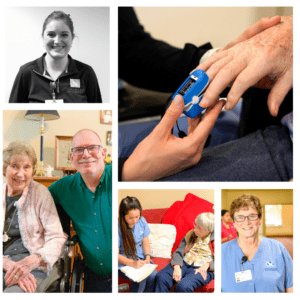This article was put together from a podcast recorded by Charles Bryce, CEO of Charlin Health Services. Charles is joined by Kathleen Fallon, a chaplain for Charlin Health. Listen to the podcast here.
The article focuses on how to deal with the grief associated with health care, specifically home health, hospice, and personal care, focusing on the geriatric population. Hospice care can be scary for both patients and their families. What are ways people can deal with grief?
The Stages of Grief
The stages of grief are fairly well known but, for the uninitiated, they include:
-
Denial
-
Anger
-
Bargaining
-
Depression
-
Acceptance
The funny thing about the stages of grief, however, is that are not necessarily linear. That is, they don’t go from denial to anger to bargaining to depression to acceptance. The stages can happen in any order for different people.
Denial
That said, most people do begin the grieving process in a state of denial, with symptoms of shock. This is do to many people not being totally prepared for losing someone very close to them. Denial can last from days to weeks (and even months or years in rare cases).
Anger
Anger usually surfaces do to regrets, estate issues, or unresolved issues with the person who passed on. The stage of anger can lead to resentment and last for longer periods of time if a person doesn’t come to terms with their loss.
Bargaining
Bargaining in relation to end-of-life care usually involves people trying to bargain with a higher power to relieve the grief from the loss of a loved one. Depression can often accompany bargaining, as a person will ask questions like ‘why did this happen?’
Depression
Depression itself can happen at almost any time during the grieving process, even lasting through the entirety. Severe depression may accompany especially traumatic losses, which may need to be treated by a mental health professional. There is no way to tell how long end-of-life-related depression will last.
Acceptance
Acceptance is usually the final stage of grief. The stage of acceptance signifies a person has totally come to terms with the loss of their loved one. Calculating when a person will move on to the stage of acceptance is impossible, as, like the rest of the stages, it is deeply individualized and personal.
Differences in Grief Processing
Unfortunately, due to the unique differences in each individual situation, it is impossible to get a clear road map showing how to deal with personal grief. Dealing with grief is a totally individualized process–even different age groups, children and adults, process grief in drastically different ways.
Children often mirror (to an extent) the emotions and behaviors exhibited by their parents or caregivers. It is very important to check in with young children often after the loss of a family member, as they may bottle up their emotions (especially if their parents seem distant or lost themselves).
Dealing with the feelings children experience but may not share is extremely important, as these emotions may manifest in harmful ways later in life. If a parent is deeply depressed and unable to properly care for the mental health of their children, finding a children’s group for grief or a counselor may be necessary.
The best way to help children deal with grief? Reach out and ask what they need!
Charlin Health Services
At Charlin Health Services we pride ourselves on honor, integrity, excellence, compassion, dignity, and trust. If you have any needs or questions about health services, hospice care, or other medical needs, please send us an email or give us a call.
About the Healthcare Expert
Kathleen Fallon started working in the healthcare industry in 1996. She started working in healthcare because she always wanted to help people with end-of-life care and associated difficulties. After years of extensive training in hospice care, Kathleen moved to Salt Lake City, UT where she was the assistant administrator of hospice services at a large assisted living facility.
While in Salt Lake City, Kathleen also oversaw the spiritual care unit. All of her work eventually lead to the establishment of an in-house hospice care unit at the assisted living facility. Kathleen eventually returned to Dallas, TX where she took up the role of chaplain at Charlin Health Services.



